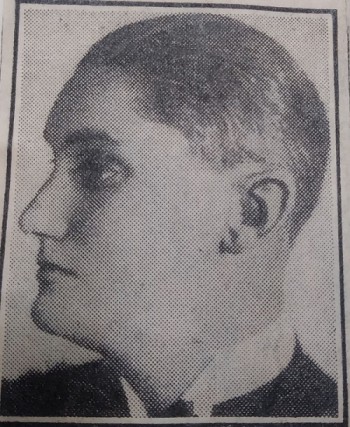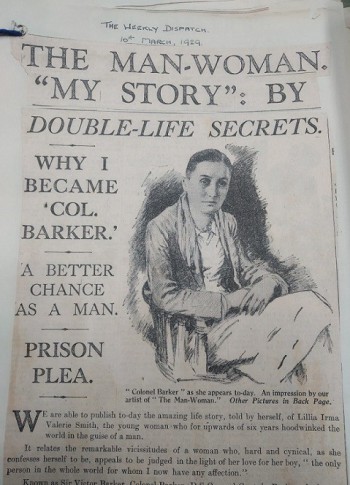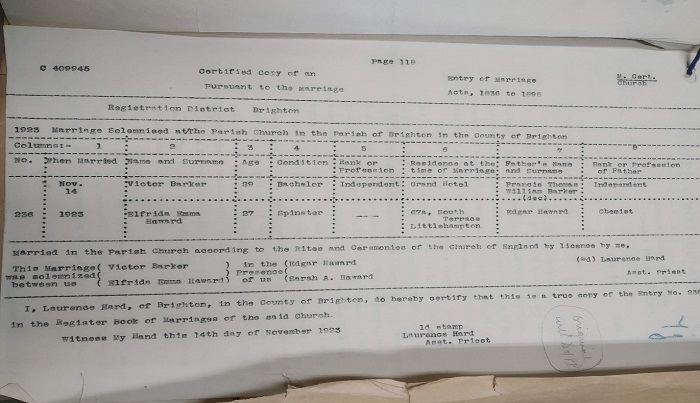
Journal
Immigrants & Minorities
Historical Studies in Ethnicity, Migration and Diaspora
Volume 8, 1989 - Issue 1-2: The Politics of Marginality: Race, the Radical Right and Minorities in Twentieth Century Britain
women and fascism
‘Colonel’ Barker: A case study in the contradictions of fascism
Julie Wheelwright
Pages 40-48 | Published online: 21 Jun 2010
Download citation
https://doi.org/10.1080/02619288.1989.9974705
In 1929 ‘Colonel’ Barker, known as a leading light in a British Fascist organization, the National Fascisti, appeared in a London court on two counts of perjury. The Colonel’ was soon revealed as Valerie Arkell‐Smith, a woman who had married her lover, Elfreda Haward, in a Brighton Parish church and literally convinced hundreds of men with her disguise. The press coverage devoted to Valerie Arkell‐Smith's sensational trial for her activities as ‘Colonel’ Barker, reveals the intricate and complex workings of gender ideology in the late 1920s. This paper also explore the reasons why, in the post‐war era, notions of female emancipation became so closely linked with militarism that Fascism appealed directly to women.
JOURNAL ARTICLE
"For Some Queer Reason": The Trials and Tribulations of Colonel Barker's Masquerade in Interwar Britain
James Vernon
Signs
Vol. 26, No. 1 (Autumn, 2000), pp. 37-62
Published by: The University of Chicago Press
https://www.jstor.org/stable/3175380
Page Count: 26
CAN BE READ ONLINE


Valerie Arkell-Smith
Victor Barker, born Lillias Irma Valerie Barker, who also went by the pseudonyms John Hill and Geoffrey Norton, was a transgender man who is notable for having married a woman. He was an officer of the National Fascisti, a bankrupt and a convicted criminal. Wikipedia
Born: August 27, 1895, St Clement, Jersey
Died: 1960
Resting place: Suffolk
Other names: Leslie Ivor Victor Gauntlett Bligh Barker, John Hill, Geoffrey Norton
LGBTQ+ history: the red rose of Colonel Barker
Monday 25 February 2019 | P E Szoradova | Records and research
Stories of women ‘masquerading’ or cross-dressing in men’s clothing were widely reported by the press in the United Kingdom at the start of the 20th century. One such ‘news story’ told of the ‘unscrupulous and profound actions’ of Colonel Victor Barker.
Before I introduce you to Barker, I should explain how I will be referring to them. To my knowledge, Colonel Barker left no personal archives, so it is difficult to assume the reasons Barker felt compelled to cross-dress and to live as a man. Therefore I will be referring to Colonel Barker as ‘he’ (him, his), and to Lillias Irma Valerie Arkell-Smith as ‘she’ (her). In doing so, I will hopefully do justice to this fascinating person.

Colonel Barker in the Daily Mail, 25 April 1929, MEPO 3/439
Colonel Barker was an alias of Lillias Irma Valerie Arkell-Smith (birth name Barker), who was born on 27 August 1895. In fact, it was one of many aliases used during his life. It was commonplace for individuals who lived as the other gender to use several names, in order to protect themselves and to live as their chosen gender.
Before becoming Colonel Barker, Valerie was a daughter of respected parents, educated in England and Belgium. In 1914, as Britain declared war on Germany, she worked in a hospital as a member of the Voluntary Aid Detachment (VAD), where she often faced the limitations of her sex and was not able to partake in activities she wanted to. This changed in 1918, when she started working on an estate in Kent and later enrolled in the Women’s Royal Air Force (WRAF), becoming a motor transport driver. Army uniforms had one advantage for her – they hid one’s femininity – and, together with the use of male nicknames, Valerie felt able to live as a male recruit.
Happy wife, happy life?
As a privileged class volunteer of VAD, Valerie Barker was admired by men; however, as the war went on, such admiration was often in short supply. Valerie married her first husband, Australian Lieutenant Harold Arkell Smith, on 27 April 1918. Unfortunately the marriage did not work, and after only six weeks Valerie fled home to her parents. Her father died soon after; following the disbandment of the WRAF, Valerie began working with a friend in a tea shop in Westminster, where she met Ernest Pearce Crouch – another Australian man who became possessive and abusive towards her.
Although they never officially married, they lived together as a married couple. Pearce Crouch managed to obtain a passport for both him and Valerie, and in 1919 they moved to Paris where they had two children. After returning from Paris, they lived on a farm and it was here, in 1922, that Valerie met Elfreda Emma Haward for the first time.
Her husband was a woman
Elfreda and Valerie became friends and in 1923, following Valerie’s estrangement from Pearce Crouch, they began living together. It was during this time that Valerie decided that her future would no longer be female; she was giving up on unsatisfactory marriages and putting her life back on track. In her own words, she felt helpless living as a woman, as she could not do what she wanted:
I I could not use my knowledge of horses, dogs and farm work and I simply had to become a man – I had to!
It was never clear whether Haward did or didn’t know Barker’s secret. After the honeymoon period was over, Victor began working for the Brighton Repertory Company, where he played only male roles. He also joined the local cricket club and took on the name Captain Barker.
His life became more and more expensive: he spent money he didn’t have on male clothes, and he started calling himself Ivor Gauntlett – until 1925 when he changed his name back to Sir Victor Barker. His expensive lifestyle lead him into debt and a first prosecution. He broke off his marriage with Haward in 1926.
Have you reached your verdict?
Barker appeared in court several times – most notably in 1927, after joining the National Fascisti movement and being prosecuted under the Firearms Act. In January 1928, Victor Barker promoted himself to Colonel. Together with his new partner (an actress), he spent the money received following the death of his brothers on premises for a new business – the Mascot Café.
This was the nail in the coffin for Barker, as the business performed badly, leading to bankruptcy and another lawsuit. It was this bankruptcy lawsuit that led to Colonel Barker’s imprisonment in Brixton prison, where his ‘true’ gender was discovered. In his own words:
It was only because of a misplaced bankruptcy notice that my secret got revealed.
(Sunday Dispatch 7.3.1929, HO 144/19128)


“A fascinating tale… written with lively humor.” -- The Times Literary Supplement
“One of the oddest true stories ever told… film producers would be mad not to snap it up.” -- Mail on Sunday
From the Publisher
In an England devastated by the terrible losses of World War I, Colonel Victor Barker was a rare man indeed. Dashing, well–respected, with impeccable manners, he was a model gentleman. His wife was proud of his good breeding and fine looks, and his young son worshipped him as a war hero. But beneath the army uniform and bearing Barker hid an astounding secret. In 1929, following a sensational trial, the good colonel was sentenced to nine months’ imprisonment. For Colonel Barker was, in fact, a woman. Her real name was Valerie Lilias Arkell–Smith, the most infamous “man–woman” of them all. Among Rose Collis’ books are A Trouser–Wearing Character, K.D. Lang, and The Mammoth Book of Lesbian Erotica.
Rose Collis | Playwright, Performer, Author, Singer, Musician ...
www.rosecollis.com
I am a nationally and internationally critically acclaimed performer, author, ... Colonel Barker's Monstrous Regiment: A Tale of Female Husbandry (Virago 2000) ... My diverse public talks and lectures have included sell-out events at the V&A, ... The show received five and four-star reviews at the Camden Fringe Festival.
The Trials of Colonel Barker
SUSSEX PLAYWRIGHTS
‘A highly enjoyable script-in-hand performance skillfully brought to life this amazing true story … ‘ Judy Upton

‘The Trials of Colonel Barker’ was adapted by Rose Collis from her own book about the extraordinary ‘Colonel Victor Barker’, and presented as a performed reading in the second (Brighton And) Hove Grown Festival of new writing in March 2017.
The development of the project to rehearsed reading stage was funded by Grants for the Arts, supported by Arts Council England.

Participating artists for The Trials of Colonel Barker included Rose Collis, Keith Drinkel, Philippa Hammond and Guy Wah.
This first rehearsed reading was produced by Rose Collis and directed by Thomas Everchild.
Review
‘A highly enjoyable script-in-hand performance skilfully brought to life this amazing true story. The play twisted and turned with pace, humour and pathos and I loved the framing device of the sideshow where Barker and ‘wife’ exploited their notoriety. I was impressed too by the objectivity and complexity in Colonel Barker’s portrayal, letting us decide for ourselves if she was a con-woman or victim of gender/sexual discrimination.’
Judy Upton
Audience comments
‘Entertaining, witty, well-researched, extraordinary story.’
‘Outstanding – the twist in this true story was unforeseen and brilliantly delivered that left audience astounded by this enjoyable performance’
‘Eye-opening story of gender-bending marriage and duplicity in 1920s Britain, told mainly through fairground freakshow and courtroom drama.’
Production history
Writer and performer Rose Collis was awarded research and development funding from Grants for the Arts, supported by Arts Council England, to create a two-act stage play based on her book ‘Colonel Barker’s Monstrous Regiment’, about the extraordinary life of Valerie Arkell-Smith, aka ‘Colonel Victor Barker’.
Virago published ‘Colonel Barker’s Monstrous Regiment’ in 2001, and it garnered enormous critical acclaim:
‘Excellent… treads a careful line between sensation and sentiment.’ Daily Telegraph
‘Collis’s unpretentious, ribald, chatty style carries this ripping yarn.’ Time Out
‘A fascinating tale…Collis has researched this book thoroughly, and she writes with a lively sense of humour.’ Times Literary Supplement
‘Rose Collis has delved meticulously…and produced a remarkably gripping and, at times, quite hilarious story.’ Val Hennessy, Daily Mail, ‘Critic’s Choice’
‘Written with style and feeling…’ Financial Time

What does the case of Colonel Barker (aka Valerie Arkell Smith)
tell us about the nature of British Fascism in the 1920s?
http://tinyurl.com/u2ycpuq
Rebecca Taylor 18 October 2016

TRANSCRIPT
Introduction
Conclusion
Emphasized his manliness through joining the NF
Violence
Place of women
Divisions
Press coverage; undermined the appeal of fascism
The National Fascisti's 'best known recruit' (Martin Pugh, p.54)
Cross- dressing
1927- Rippon Seymour uses Barker's revolver against another NF member
1929- arrested for failing to appear in Court over charges of bankruptcy
Colonel Barker (aka Valerie Arkell Smith)
Implications for British Fascism in the 1920s
Movement is already divided (British Fascists/ National Fascist/ Imperial Fascist League)
Other fascist groups distance themselves from Rippon Seymour's NF
Fencing and boxing
Street violence 'smash the Reds'
'Made the fascists look ridiculous' (Pugh,p. 55)- belief in gender roles
TRIAL
Sobbed and fainted in the dock
Trial was popular
Press coverage
'bold'

Valerie Arkell-Smith
Victor Barker, born Lillias Irma Valerie Barker, who also went by the pseudonyms John Hill and Geoffrey Norton, was a transgender man who is notable for having married a woman. He was an officer of the National Fascisti, a bankrupt and a convicted criminal. Wikipedia
Born: August 27, 1895, St Clement, Jersey
Died: 1960
Resting place: Suffolk
Other names: Leslie Ivor Victor Gauntlett Bligh Barker, John Hill, Geoffrey Norton
LGBTQ+ history: the red rose of Colonel Barker
Monday 25 February 2019 | P E Szoradova | Records and research
Stories of women ‘masquerading’ or cross-dressing in men’s clothing were widely reported by the press in the United Kingdom at the start of the 20th century. One such ‘news story’ told of the ‘unscrupulous and profound actions’ of Colonel Victor Barker.
Before I introduce you to Barker, I should explain how I will be referring to them. To my knowledge, Colonel Barker left no personal archives, so it is difficult to assume the reasons Barker felt compelled to cross-dress and to live as a man. Therefore I will be referring to Colonel Barker as ‘he’ (him, his), and to Lillias Irma Valerie Arkell-Smith as ‘she’ (her). In doing so, I will hopefully do justice to this fascinating person.

Colonel Barker in the Daily Mail, 25 April 1929, MEPO 3/439
Colonel Barker was an alias of Lillias Irma Valerie Arkell-Smith (birth name Barker), who was born on 27 August 1895. In fact, it was one of many aliases used during his life. It was commonplace for individuals who lived as the other gender to use several names, in order to protect themselves and to live as their chosen gender.
Before becoming Colonel Barker, Valerie was a daughter of respected parents, educated in England and Belgium. In 1914, as Britain declared war on Germany, she worked in a hospital as a member of the Voluntary Aid Detachment (VAD), where she often faced the limitations of her sex and was not able to partake in activities she wanted to. This changed in 1918, when she started working on an estate in Kent and later enrolled in the Women’s Royal Air Force (WRAF), becoming a motor transport driver. Army uniforms had one advantage for her – they hid one’s femininity – and, together with the use of male nicknames, Valerie felt able to live as a male recruit.
Happy wife, happy life?
As a privileged class volunteer of VAD, Valerie Barker was admired by men; however, as the war went on, such admiration was often in short supply. Valerie married her first husband, Australian Lieutenant Harold Arkell Smith, on 27 April 1918. Unfortunately the marriage did not work, and after only six weeks Valerie fled home to her parents. Her father died soon after; following the disbandment of the WRAF, Valerie began working with a friend in a tea shop in Westminster, where she met Ernest Pearce Crouch – another Australian man who became possessive and abusive towards her.
Although they never officially married, they lived together as a married couple. Pearce Crouch managed to obtain a passport for both him and Valerie, and in 1919 they moved to Paris where they had two children. After returning from Paris, they lived on a farm and it was here, in 1922, that Valerie met Elfreda Emma Haward for the first time.
Her husband was a woman
Elfreda and Valerie became friends and in 1923, following Valerie’s estrangement from Pearce Crouch, they began living together. It was during this time that Valerie decided that her future would no longer be female; she was giving up on unsatisfactory marriages and putting her life back on track. In her own words, she felt helpless living as a woman, as she could not do what she wanted:
I I could not use my knowledge of horses, dogs and farm work and I simply had to become a man – I had to!
(Sunday Dispatch 7.3.1929, HO 144/19128)
Taking back the family name, Valerie became Sir Victor Barker and started a new life with her partner, Haward. Although Haward met Barker when he was living as a woman, Barker told her that he was wounded during the war, sustaining an injury to his abdomen. You may be wondering how was it possible that Haward ever believed Barker, but the pair started living together in the Grand Hotel in Brighton. Under pressure from Haward’s parents, who thought Sir Victor Barker was a man, the couple married on 14 November 1923.

A picture of the marriage certificate between Victor Barker
Taking back the family name, Valerie became Sir Victor Barker and started a new life with her partner, Haward. Although Haward met Barker when he was living as a woman, Barker told her that he was wounded during the war, sustaining an injury to his abdomen. You may be wondering how was it possible that Haward ever believed Barker, but the pair started living together in the Grand Hotel in Brighton. Under pressure from Haward’s parents, who thought Sir Victor Barker was a man, the couple married on 14 November 1923.

A picture of the marriage certificate between Victor Barker
and Elfrida Emma Haward from November 1923, HO 144/19128
It was never clear whether Haward did or didn’t know Barker’s secret. After the honeymoon period was over, Victor began working for the Brighton Repertory Company, where he played only male roles. He also joined the local cricket club and took on the name Captain Barker.
His life became more and more expensive: he spent money he didn’t have on male clothes, and he started calling himself Ivor Gauntlett – until 1925 when he changed his name back to Sir Victor Barker. His expensive lifestyle lead him into debt and a first prosecution. He broke off his marriage with Haward in 1926.
Have you reached your verdict?
Barker appeared in court several times – most notably in 1927, after joining the National Fascisti movement and being prosecuted under the Firearms Act. In January 1928, Victor Barker promoted himself to Colonel. Together with his new partner (an actress), he spent the money received following the death of his brothers on premises for a new business – the Mascot Café.
This was the nail in the coffin for Barker, as the business performed badly, leading to bankruptcy and another lawsuit. It was this bankruptcy lawsuit that led to Colonel Barker’s imprisonment in Brixton prison, where his ‘true’ gender was discovered. In his own words:
It was only because of a misplaced bankruptcy notice that my secret got revealed.
(Sunday Dispatch 7.3.1929, HO 144/19128)
On 25 April 1929, Barker was prosecuted at the Old Bailey for perjury – for submitting false information on a marriage certificate – to which Barker pleaded guilty. The judge, Sir Ernest Wilde, decided to ignore the previous lawsuits and focus on the act of perjury. The court was full of women, to the extent that there were even rows of chairs outside. Barker’s sentence was set at nine months.

News article from the Weekly Dispatch from 10th March 1929, HO 144/19128
Sir Ernest Wilde’s concluding remarks painted Barker as an evil person who, if unpunished, would lead others to follow his example. He described Barker’s actions as unprincipled, mendacious and unscrupulous, and Barker as someone who had outraged the decencies of nature and broken the law of man.
These words broke Barker’s composure. As he bowed his head, he was overcome with sadness – his entire person looked grey and despairing, except for the bright red rose in his buttonhole.
Colonel Barker was prosecuted for being different in a society in which it was unacceptable to stand out. He was being held to account for choosing to live differently. He is just one example of the many gender-different individuals prosecuted, either under the Perjury Act or under the Metropolitan Police Act, for a breach of the peace; however, the act of cross-dressing or wearing the opposite gender’s clothes was not illegal in the United Kingdom.
Colonel Barker was one of the many pioneers who stood their ground and lived their lives under the gaze of public scrutiny. His actions, together with his peers’ and successors’, influenced the creation of the Gender Recognition Act (GRA) in 2004. This legislation helped many people, but its archaic form led to the consultation of the GRA in late 2018.
After his release from Holloway prison, Colonel Barker went on to write several articles for the Sunday Dispatch describing his life and future.
We are delighted to be hosting P E Szoradova, who is a student at Goldsmiths, University of London, currently studying for their MA in Queer History.
https://blog.nationalarchives.gov.uk/lgbtq-history-the-red-rose-of-colonel-barker/
https://blog.nationalarchives.gov.uk/lgbtq-history-the-red-rose-of-colonel-barker/

“A fascinating tale… written with lively humor.” -- The Times Literary Supplement
“One of the oddest true stories ever told… film producers would be mad not to snap it up.” -- Mail on Sunday
From the Publisher
In an England devastated by the terrible losses of World War I, Colonel Victor Barker was a rare man indeed. Dashing, well–respected, with impeccable manners, he was a model gentleman. His wife was proud of his good breeding and fine looks, and his young son worshipped him as a war hero. But beneath the army uniform and bearing Barker hid an astounding secret. In 1929, following a sensational trial, the good colonel was sentenced to nine months’ imprisonment. For Colonel Barker was, in fact, a woman. Her real name was Valerie Lilias Arkell–Smith, the most infamous “man–woman” of them all. Among Rose Collis’ books are A Trouser–Wearing Character, K.D. Lang, and The Mammoth Book of Lesbian Erotica.
Rose Collis | Playwright, Performer, Author, Singer, Musician ...
www.rosecollis.com
I am a nationally and internationally critically acclaimed performer, author, ... Colonel Barker's Monstrous Regiment: A Tale of Female Husbandry (Virago 2000) ... My diverse public talks and lectures have included sell-out events at the V&A, ... The show received five and four-star reviews at the Camden Fringe Festival.
The Trials of Colonel Barker
SUSSEX PLAYWRIGHTS
‘A highly enjoyable script-in-hand performance skillfully brought to life this amazing true story … ‘ Judy Upton

‘The Trials of Colonel Barker’ was adapted by Rose Collis from her own book about the extraordinary ‘Colonel Victor Barker’, and presented as a performed reading in the second (Brighton And) Hove Grown Festival of new writing in March 2017.
The development of the project to rehearsed reading stage was funded by Grants for the Arts, supported by Arts Council England.

Participating artists for The Trials of Colonel Barker included Rose Collis, Keith Drinkel, Philippa Hammond and Guy Wah.
This first rehearsed reading was produced by Rose Collis and directed by Thomas Everchild.
Review
‘A highly enjoyable script-in-hand performance skilfully brought to life this amazing true story. The play twisted and turned with pace, humour and pathos and I loved the framing device of the sideshow where Barker and ‘wife’ exploited their notoriety. I was impressed too by the objectivity and complexity in Colonel Barker’s portrayal, letting us decide for ourselves if she was a con-woman or victim of gender/sexual discrimination.’
Judy Upton
Audience comments
‘Entertaining, witty, well-researched, extraordinary story.’
‘Outstanding – the twist in this true story was unforeseen and brilliantly delivered that left audience astounded by this enjoyable performance’
‘Eye-opening story of gender-bending marriage and duplicity in 1920s Britain, told mainly through fairground freakshow and courtroom drama.’
Production history
Writer and performer Rose Collis was awarded research and development funding from Grants for the Arts, supported by Arts Council England, to create a two-act stage play based on her book ‘Colonel Barker’s Monstrous Regiment’, about the extraordinary life of Valerie Arkell-Smith, aka ‘Colonel Victor Barker’.
Virago published ‘Colonel Barker’s Monstrous Regiment’ in 2001, and it garnered enormous critical acclaim:
‘Excellent… treads a careful line between sensation and sentiment.’ Daily Telegraph
‘Collis’s unpretentious, ribald, chatty style carries this ripping yarn.’ Time Out
‘A fascinating tale…Collis has researched this book thoroughly, and she writes with a lively sense of humour.’ Times Literary Supplement
‘Rose Collis has delved meticulously…and produced a remarkably gripping and, at times, quite hilarious story.’ Val Hennessy, Daily Mail, ‘Critic’s Choice’
‘Written with style and feeling…’ Financial Time

What does the case of Colonel Barker (aka Valerie Arkell Smith)
tell us about the nature of British Fascism in the 1920s?
http://tinyurl.com/u2ycpuq
Rebecca Taylor 18 October 2016
TRANSCRIPT
Introduction
Conclusion
Emphasized his manliness through joining the NF
Violence
Place of women
Divisions
Press coverage; undermined the appeal of fascism
The National Fascisti's 'best known recruit' (Martin Pugh, p.54)
Cross- dressing
1927- Rippon Seymour uses Barker's revolver against another NF member
1929- arrested for failing to appear in Court over charges of bankruptcy
Discovered to be a woman
Charged with false statement on a marriage certificate
What does the case of Colonel Barker (aka Valerie Arkell Smith)
tell us about the nature of British Fascism in the 1920s?
Charged with false statement on a marriage certificate
What does the case of Colonel Barker (aka Valerie Arkell Smith)
tell us about the nature of British Fascism in the 1920s?
Colonel Barker (aka Valerie Arkell Smith)
Implications for British Fascism in the 1920s
Movement is already divided (British Fascists/ National Fascist/ Imperial Fascist League)
Other fascist groups distance themselves from Rippon Seymour's NF
Fencing and boxing
Street violence 'smash the Reds'
'Made the fascists look ridiculous' (Pugh,p. 55)- belief in gender roles
TRIAL
Sobbed and fainted in the dock
Trial was popular
Press coverage
'bold'



